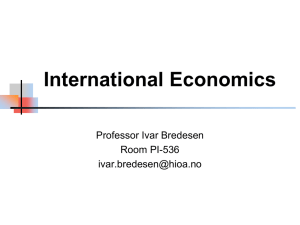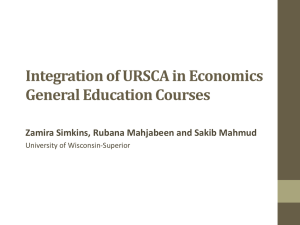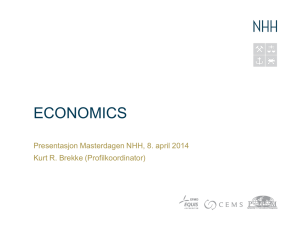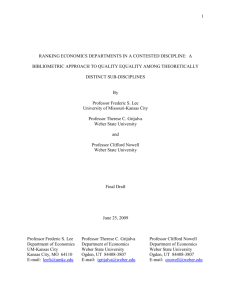ECON 325 RADICAL ECONOMICS
advertisement
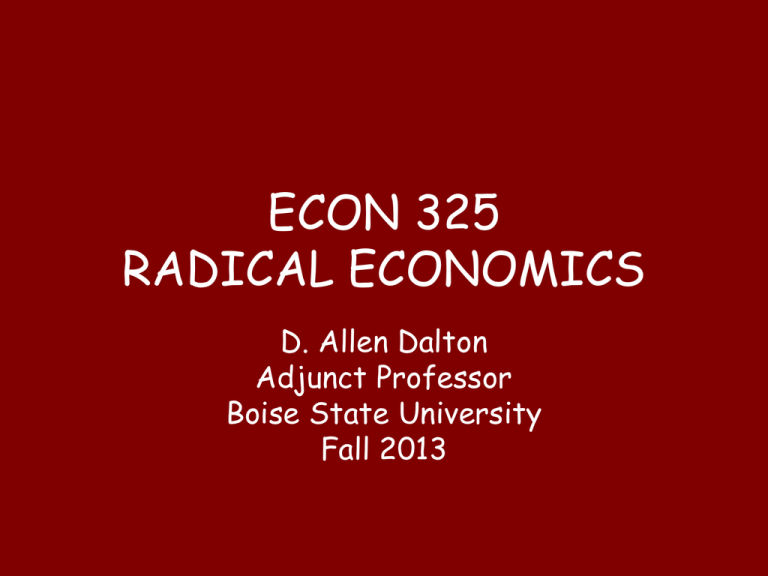
ECON 325 RADICAL ECONOMICS D. Allen Dalton Adjunct Professor Boise State University Fall 2013 Course Introduction Syllabus • Texts • Expectations of Students • Classroom Conduct and Expectations • Grading • Written Presentations • Class Participation • Exams Syllabus • Important Items • Paper grading • Open Source Internet sites • Class Participation guidelines • Resources • Course Outline and Readings What is Radical Economics? Catalog Course Description Analysis of radical political economic thought and its applications to the study of socioeconomic problems. Topics include Marxian socialist economic theory, libertarianism, anarchist theory, evolutionary economic theory, and other radical models. Issues such as imperialism, economic and social inequality, and alienation will be considered. Radical Political Economy and Heterodox Economic Theory Radical Political Economy • Normative • Critical of fundamental institutions within society • Proposals for fundamental restructuring of basic institutions Radical Political Economy • • • • “Participatory Economics” Market Socialism Marxism Anarchism – – – – Syndicalism Mutualism Federated Communities Anarcho-Capitalism Heterodox Economics • Positive • Critical of the way in which “mainstream” economics is done – Lack of realism – Hidden biases • Alternative explanations for economic action Heterodox Economics • • • • • Austrian Economics Post-Keynesian Economics Social Economics Institutional Economics Sraffian-Kaleckian Economics Why should one study Radical Economics? A. Isn’t modern economic theory (as found in textbooks and taught in courses) the apex of the progressive development of the science? B. As a positive science, don’t economists shed false theories and adopt true theories? If A and B are true, why study heterodox viewpoints? Why should one study Radical Economics? “Recognize that many theories are shortlived and that they often reflect the concerns of a particular time period, and thereby come to a critical understanding of contemporary theory.” - Bruce Caldwell, Syllabus, History of Economic Thought, EC 555, Fall 2003, UNC-Greensboro. Why should one study Radical Economics? “Kuhn demolished the…theory…that scientific thought progresses patiently, one year after another developing, sifting and testing theories, so that science marches onward and upward…[E]conomics can and has proceeded in contentious, even zig-zag fashion, with later systemic fallacy sometimes elbowing aside earlier but sounder paradigms, thereby redirecting economic thought down a total erroneous or even tragic path.” - Murray Rothbard, Economic Thought before Adam Smith, Edward Elgar, 1995, pp. ix-x. Why should one study Radical Economics? “Marx’s critique of political economy is both an immanent criticism of bourgeois economic theory, made by showing that there is no connection between that theory’s assumptions and the conclusions drawn from them, and a fundamental criticism, which maintains that by assuming its own economic relations to be natural and unchangeable the whole of bourgeois economic theory fails, and must fail, to comprehend its own society, thereby condemning itself to misapprehend its own development as well as to misconceive its state of being at any particular time.” - Paul Mattick, “Marxism and Bourgeois Economics,” in Marxism, last refuge of the bourgeoisie?, Merlin Press, 1983, p. 3. How to Study Radical Economics? Schools of Thought The Notion of Schools of Thought “A school within a science is a collection of affiliated scientists who display a considerably higher degree of agreement upon a particular set of views than the science as a whole displays… A school must have a leader, because the consensus of its members will normally be achieved and maintained by major scientific entrepreneurs.“ - George Stigler, The Economist as Preacher, Basil Blackwell, 1982, p. 116. The Notion of Schools of Thought “…a genuine school in our sense: there was one master, one doctrine, personal coherence; there was a core; there were zones of influence; there were fringe ends.” - Joseph Schumpeter, History of Economic Analysis, Oxford University Press, 1954, p. 470. My Biases • (Anti-)Politics – Individualist Anarchist • Economics – Austrian Eclectic • Political Economy – Free Market Anti-Capitalist



